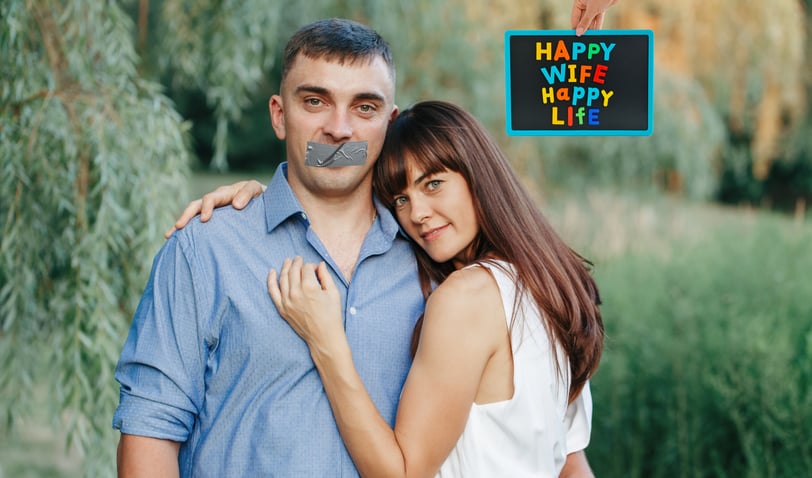Suffering In Silence: Why Narcissists Get Away With Abuse
Many people believe they’d see abuse from a mile away—that there’d be obvious signs. But, as I’ve come to learn, narcissistic abuse is often subtle, weaving itself into the little corners of life. It's easy to miss, and before you know it, you’re trapped in a reality you barely recognize. Today, I want to talk about a topic that often goes unnoticed: suffering in silence.
RELATIONSHIPSTRAUMA & ABUSE
Tyrone
11/1/20245 min read


The Kidnapping Plot
I love a good suspense movie—give me a mystery with a twist, something that feels close to reality but keeps me guessing. But for years, there was one storyline I just couldn’t stomach: kidnapping.
You know the type—where someone is snatched away, trapped in a twisted reality controlled by someone else, all for the kidnapper’s pleasure. I used to avoid those movies like the plague.
I hated the feeling they gave me, but I couldn’t explain why. And it wasn’t until much later, sitting alone in a hotel room in Palm Beach, that it all started to make sense.
The Subtle Chains of Control
Back then, I didn’t know I was in a narcissistic relationship. To me, we were just a couple with some issues to work through. After all, we had good times. She was beautiful, and when things were good, they were really good. She’d laugh at my jokes, and I’d remember why I married her.
Those moments felt normal, familiar, like little reminders of the life I’d built and the person I thought I was with.
But then there were other times. She’d explode over the smallest things. Things that should never have mattered, like leaving my shoes at the door.
I suggested buying a shoe rack to keep things neat, but she looked at me like I was out of my mind. No, she wanted me to follow her rules—walk my shoes from the door to the closet every day, like she did.
I tried to make sense of it, but nothing worked. I was a grown man in my own home, being lectured about shoes at the door.
When I’d bring it up with friends, they’d brush it off: “Just do what she wants, man. Happy wife, happy life, right?” I’d laugh along, but inside, I couldn’t shake the feeling that something was really wrong. I just couldn’t put my finger on it back then.
Living in Two Realities
Back to that weekend in Palm Beach. I’d wrapped up business early and found myself alone, flipping through channels in my hotel room. I wasn’t rushing to get home; everyone was celebrating Easter, but I’d left religion behind years ago, and I was happy for the quiet time. Eventually, I landed on a movie halfway through, something about a woman walking around with her “husband” in a picture-perfect town.
Then the twist hit. She’d been kidnapped. She could walk around and look free, but it was all part of a twisted reality. The moment she got home, chains and all, the facade shattered. She’d been made to live out a life on display for everyone else, hiding the pain and fear she felt behind closed doors. She was a prisoner.
I couldn’t tear my eyes away. I’d usually avoid this type of movie, but something made me sit through it, maybe because I was alone, in a new place, free to watch whatever I wanted.
Watching her put on that mask for the world while silently suffering felt like a punch to the gut. It was like looking into a mirror. I didn’t realize it fully then, but that woman’s life—her two worlds, her “perfect” life masking a nightmare—was my life.
Back home, everyone saw us as the perfect couple. They’d say things like, “Wow, she’s gorgeous! You’re so lucky!” or “You two are inseparable; you must have an amazing relationship.” They saw the vacations, the dinners, the happy photos.
But they didn’t see what happened when the camera was off, the countless times I’d walk on eggshells to keep the peace, never knowing what would set her off next. The smallest, most innocent actions were somehow always wrong.
Sometimes, I’d just want to unwind and watch a show by myself, something she didn’t like, maybe a suspenseful mystery or dystopian drama. But even then, she found a way to control it.
She’d walk in, take one look at the screen, and make a face: “You actually enjoy this? Can’t we watch something else?” I’d protest, remind her we had TVs in nearly every room.
She’d smile, say she just wanted to be with me. “Can’t you watch it some other time?” she’d ask, knowing I wouldn’t. I eventually stopped trying to watch those shows altogether. I’d trained myself to hate what she hated, to shrink and fit her world, until my own interests just faded away.
But sitting there in Palm Beach, inhaling that movie, I felt something wake up in me. I ended up finding it on another channel to watch from the beginning. The storyline sucked me in, yet haunted me. I felt like I’d been living in two worlds for years, like I’d been in my own kind of captivity.
Sure, I wasn’t physically chained, but I was emotionally bound, trapped in a cycle of pleasing her, fighting her, and getting nowhere. I’d built this life, worked myself up from a rough start to something solid, something I was proud of. But what was the point if I couldn’t even enjoy it?


The Decision: Red Pill or Blue Pill?
My friends and family couldn’t understand why I wasn’t happy. They saw the trips, the house, the image of a dream life. They’d never believe that behind all that, I was barely holding on, like an actor in someone else’s play. I couldn’t say anything without sounding petty.
Who would believe me if I said, “I’m miserable because she won’t let me watch my own shows or put my shoes by the door”? It sounded ridiculous, even to me. But the pain was real, and it kept adding up in ways no one else could see.
If you’ve ever seen The Matrix, you know the classic choice: the blue pill, where you keep living in ignorance, or the red pill, where you wake up to reality. For years, I chose the blue pill. I kept the peace, stuck with familiar friends, let her be in control of our social circles, our lives, our home. But as time went on, the cost of staying silent became unbearable.
Finally, I chose the red pill. I decided to walk away. At first, everyone around me was shocked. They couldn’t understand. To them, it looked like I’d abandoned the perfect life. But they hadn’t seen the invisible chains, the control, the manipulation.
It wasn’t until I decided to leave that I understood the true cost of staying silent all those years. When I finally broke free, I expected relief, but instead, I faced backlash from nearly everyone.
People took her side, believed her stories that I’d had some kind of crisis, or that I was selfish, unfaithful, you name it. She’d started a smear campaign before I even really knew what one was. And just like that, the people I thought would support me vanished, they all became "Agent Smith".
The Road to Freedom
For the first time, though, I didn’t care what they thought. I was finally free to be myself, to choose my reality without her twisting my mind. Sure, I lost a lot, but I gained something I could never put a price on: peace.
I understand now why people suffer in silence. Narcissistic abuse isn’t loud and obvious; it’s subtle, made of tiny manipulations, each one chiseling away at your confidence, your sense of self, until you’re nothing but a shadow of who you once were. And when you try to leave, they make sure everyone else sees you as the problem.
But I’m here, on the other side. The life I have now might seem smaller, but it’s mine. And the freedom, the peace that comes with it—it’s priceless. So if any part of my story sounds like yours, know this: you don’t have to suffer in silence. You can step out of the two worlds and reclaim your own life.

